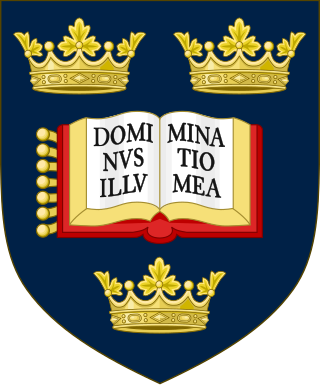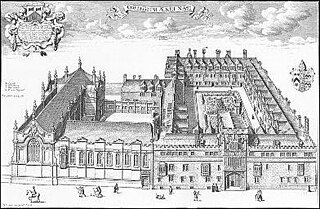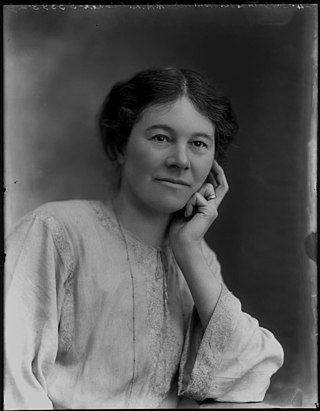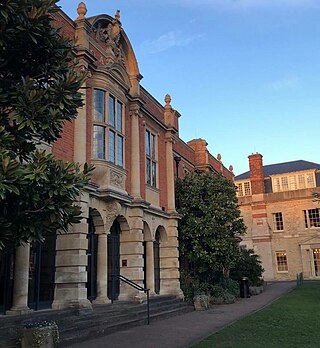Related Research Articles

The University of Oxford is a collegiate research university in Oxford, England. There is evidence of teaching as early as 1096, making it the oldest university in the English-speaking world and the world's second-oldest university in continuous operation. It grew rapidly from 1167, when Henry II banned English students from attending the University of Paris. After disputes between students and Oxford townsfolk, some Oxford academics fled northeast to Cambridge, where, in 1209, they established the University of Cambridge. The two English ancient universities share many common features and are jointly referred to as Oxbridge.

Somerville College, a constituent college of the University of Oxford in England, was founded in 1879 as Somerville Hall, one of its first two women's colleges. Among its alumnae have been Margaret Thatcher, Indira Gandhi, Dorothy Hodgkin, Iris Murdoch, Philippa Foot, Vera Brittain and Dorothy L. Sayers. It began admitting men in 1994. Its library is one of Oxford's largest college libraries. The college's liberal tone derives from its founding by social liberals, as Oxford's first non-denominational college for women, unlike the Anglican Lady Margaret Hall, the other to open that year. In 1964, it was among the first to cease locking up at night to stop students staying out late. No gowns are worn at formal halls.

Lady Margaret Hall (LMH) is one of the constituent colleges of the University of Oxford in England, located on a bank of the River Cherwell at Norham Gardens in north Oxford and adjacent to the University Parks. The college is more formally known under its current royal charter as "The Principal and Fellows of the College of the Lady Margaret in the University of Oxford".

St Anne's College is a constituent college of the University of Oxford in England. It was founded in 1879 and gained full college status in 1959. Originally a women's college, it has admitted men since 1979. It has some 450 undergraduate and 200 graduate students and retains an original aim of allowing women of any financial background to study at Oxford. It still has a student base with a higher than average proportion of female students. The college stands between Woodstock and Banbury roads, next to the University Parks. In April 2017, Helen King, a retired Metropolitan Police Assistant Commissioner, took over as Principal from Tim Gardam. Former members include Danny Alexander, Edwina Currie, Ruth Deech, Helen Fielding, William MacAskill, Amanda Pritchard, Simon Rattle, Tina Brown, Mr Hudson and Victor Ubogu.

St Hugh's College is one of the constituent colleges of the University of Oxford. It is located on a 14.5-acre (5.9-hectare) site on St Margaret's Road, to the north of the city centre. It was founded in 1886 by Elizabeth Wordsworth as a women's college, and accepted its first male students in its centenary year in 1986. Prominent alumni include Theresa May, Aung San Suu Kyi, Amal Clooney and Heather Hallett, Baroness Hallett. It enjoys a reputation as one of the most attractive colleges because of its extensive gardens.

The University of Oxford has 36 colleges, three societies, and four permanent private halls (PPHs) of religious foundation. The colleges and PPHs are autonomous self-governing corporations within the university. These colleges are not only houses of residence, but have substantial responsibility for teaching undergraduate students. Generally tutorials and classes are the responsibility of colleges, while lectures, examinations, laboratories, and the central library are run by the university. Students normally have most of their tutorials in their own college, but often have a couple of modules taught at other colleges or even at faculties and departments. Most colleges take both graduates and undergraduates, but several are for graduates only.
The National Union of Women Suffrage Societies (NUWSS), also known as the suffragists was an organisation founded in 1897 of women's suffrage societies around the United Kingdom. In 1919 it was renamed the National Union of Societies for Equal Citizenship.

The United Procession of Women, or Mud March as it became known, was a peaceful demonstration in London on 9 February 1907 organised by the National Union of Women's Suffrage Societies (NUWSS), in which more than three thousand women marched from Hyde Park Corner to the Strand in support of women's suffrage. Women from all classes participated in what was the largest public demonstration supporting women's suffrage seen up to that date. It acquired the name "Mud March" from the day's weather, when incessant heavy rain left the marchers drenched and mud-spattered.

Dame Louisa Innes Lumsden was a Scottish pioneer of female education. Lumsden was one of the first five students Hitchen College, later Girton College, Cambridge in 1869 and one of the first three women to pass the Tripos exam in 1873. She returned as the first female resident and tutor to Girton in 1873.

Mary Danvers Stocks, Baroness Stocks was a British writer. She was closely associated with the Strachey, the Wedgwood and the Ricardo families. Her family was deeply involved in changes in the Victorian Era and Stocks herself was deeply involved in women's suffrage, the welfare state, and other aspects of social work.

Jessie Chrystal Macmillan was a suffragist, peace activist, barrister, feminist and the first female science graduate from the University of Edinburgh as well as that institution's first female honours graduate in mathematics. She was an activist for women's right to vote, and for other women's causes. She was the second woman to plead a case before the House of Lords, and was one of the founders of the Women's International League for Peace and Freedom.

The Liverpool Women's Suffrage Society was set up in 1894 by Edith Bright, Lydia Allen Booth and Nessie Stewart-Brown to promote the enfranchisement of women. The society held its first meeting in a Liverpool temperance hall, with Millicent Fawcett, head of the National Union of Women's Suffrage Societies (NUWSS), as its guest speaker. The society set up headquarters in Lord Street. The group became affiliated with the NUWSS in 1898, it held meetings in cafés which included talks, poetry and dance recitals. Members were recruited from prominent members of society and they distanced themselves from working class suffrage societies such as Women's Social and Political Union (WSPU).

Lettice Fisher was the founder of the National Council for the Unmarried Mother and her Child, now known as Gingerbread. She was also an economist and a historian.

Margaret Hills was a British teacher, suffragist organiser, feminist and socialist. She was the first female councillor on Stroud Urban District Council and later served as a Councillor on Gloucestershire County Council.

Somerville College Library is the college library of Somerville College, one of the 38 colleges of the University of Oxford. The library is one of the largest college libraries at the University of Oxford and has achieved 100% student satisfaction in several annual surveys.

Helena Clara Deneke (1878–1973) was a British Germanist at Oxford University. She was an enthusiast for women's suffrage and for the Women's Institutes. She was "something of a legend in the Oxford of her day".
Margaret Hayes-Robinson (1876-1930) was a British historian and the head of Royal Holloway's History Department between 1899 and 1911.

The Oxford Women Students' Society for Women's Suffrage (OWSSWS) was a student society concerned with women's suffrage in Oxford, England.
Elspeth Hughes-Davies, Lady Rhŷs, known also as Elspeth Rhŷs, was a Welsh teacher, linguist, and campaigner for women's suffrage and education.
Olwen Rhys, also spelled Olwen Rhŷs, was a Welsh scholar and suffragist. She was a member of and later a lecturer for the Society of Oxford Home Students, which would go on to become St Anne's College, Oxford. In her honour, an Olwen Rhys Fellowship for graduate research was established at St Anne's College, Oxford.
References
- 1 2 3 4 5 "The Oxford Society for Women's Suffrage". firstwomenatoxford.ox.ac.uk. UK: University of Oxford . Retrieved 27 August 2024.
- ↑ "The Oxford Women Students' Society for Women's Suffrage". firstwomenatoxford.ox.ac.uk. UK: University of Oxford . Retrieved 27 August 2024.
- ↑ Prochaska, Alice (15 November 2014). "Reflections on the History and Identity of the former women's colleges". The History of Oxford Colleges Conference. UK: Somerville College, Oxford . Retrieved 27 August 2024.
- ↑ "Annual report of the Oxford Society for Women's Suffrage". lux.collections.yale.edu. Yale University . Retrieved 27 August 2024.